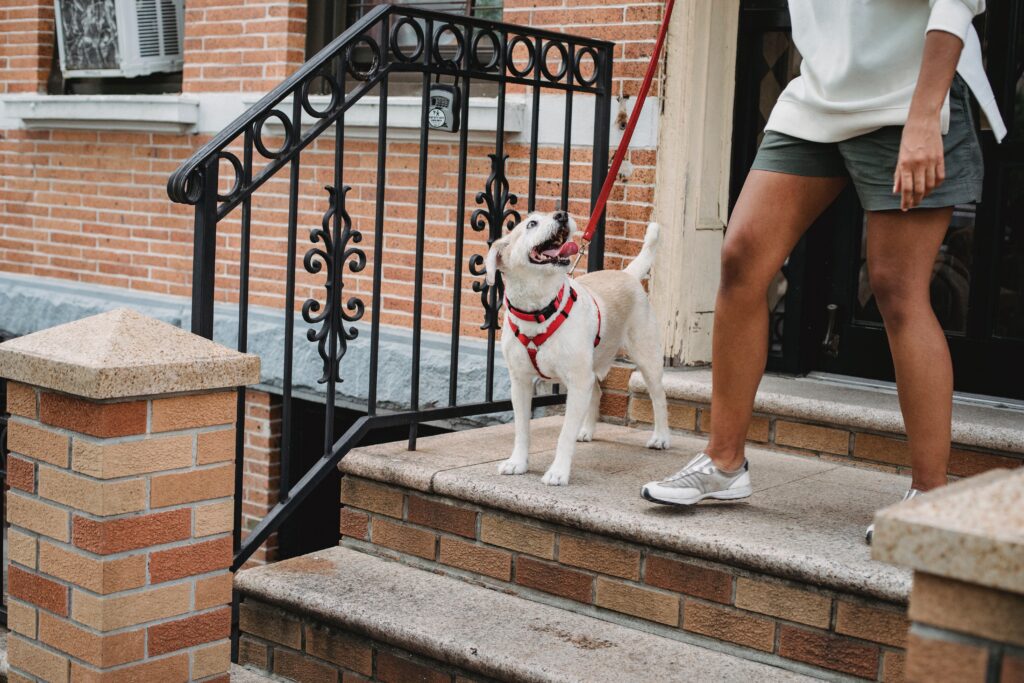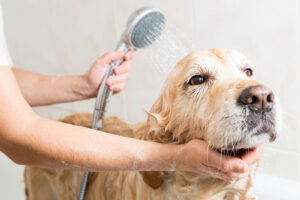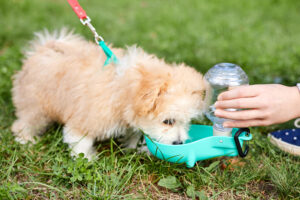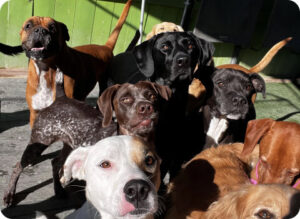
Making the Separation Easier: Pre-Boarding Tips for Dog Owners
Preparing your dog for a boarding stay is of utmost importance to ensure their well-being and reduce separation anxiety. Dogs are social creatures that thrive on routine and familiarity, so being separated from their owners can be stressful. However, with the right pre-boarding tips, you can help ease their anxiety and make the separation process more manageable for both you and your beloved pet.

Boarding Clients!*Discount does not apply during holiday/peak rate periods.

Importance of Preparing Your Dog for a Boarding Stay
Understanding the importance of preparing your dog for a boarding stay is key to ensuring their comfort and emotional well-being. Dogs are highly sensitive to changes in their environment and routine, and sudden separations can cause stress and anxiety. By taking the time to prepare them beforehand, you can minimize these negative emotions and create a smoother transition.
How Pre-Boarding Tips Can Help Ease Separation Anxiety
Pre-boarding tips are specifically designed to help alleviate separation anxiety in dogs. By following these tips, you can familiarize your dog with the boarding facility, establish routines, and provide them with the comfort they need during the separation period. These tips aim to create a sense of security and minimize stress, making the boarding experience more positive for your dog.
Researching and Choosing a Boarding Facility
Importance of Selecting a Reputable and Reliable Boarding Facility
When it comes to boarding your dog, choosing a reputable and reliable facility is paramount. You want to ensure that your furry friend is in a safe and caring environment. Look for facilities that have a positive reputation and a track record of providing excellent care for animals. This will give you peace of mind during your dog’s stay.
Considerations for Assessing the Facility's Amenities and Staff Qualifications
Take the time to evaluate the amenities and services offered by the boarding facility. Consider factors such as the size and cleanliness of the accommodations, the availability of outdoor areas for exercise, and the quality of care provided. Additionally, inquire about the qualifications and experience of the staff members who will be responsible for looking after your dog.
Reading Reviews and Seeking Recommendations from Trusted Sources
Reading reviews and seeking recommendations from trusted sources is an excellent way to gather insights into the experiences of other dog owners. Online platforms, such as review websites or social media groups dedicated to pet care, can provide valuable feedback about different boarding facilities. Additionally, seek recommendations from friends, family, or your veterinarian, as their firsthand experiences can help guide your decision-making process.
Familiarizing Your Dog with the Boarding Facility
Scheduling a Pre-Boarding Visit to the Facility
If possible, schedule a pre-boarding visit to the facility. This allows your dog to become familiar with the surroundings and the scent of the facility. It also gives you an opportunity to meet the staff, ask questions, and address any concerns you may have. A pre-boarding visit can help alleviate anxiety and make the transition smoother for your dog.
Allowing Your Dog to Explore the Environment and Meet the Staff
During the pre-boarding visit, allow your dog to explore the facility under the guidance of the staff. This helps them become acquainted with the new environment, smells, and sounds. Introduce your dog to the staff members who will be responsible for their care. This interaction helps establish a sense of trust and comfort for your dog.
Introducing Your Dog to the Boarding Routine and Surroundings
During the pre-boarding visit, request to have your dog participate in a typical boarding routine. This may include going into a kennel or a designated sleeping area, following basic commands, or engaging in socialization activities with other dogs. These familiarization exercises can help your dog become more comfortable with the boarding routine and reduce anxiety during their actual stay.

Maintaining a Consistent Routine
Stick to Your Dog's Regular Feeding and Exercise Schedule
During the pre-boarding period, it’s important to maintain your dog’s regular feeding and exercise schedule as much as possible. Keeping their routine consistent helps them feel secure and reduces anxiety. Feed your dog at the same times and in the same portions as usual, providing them with the familiarity of their regular meals. Similarly, continue their exercise routine, ensuring they receive adequate physical activity and mental stimulation.
Ensure Your Dog Receives Enough Mental and Physical Stimulation
In addition to regular exercise, make sure your dog receives ample mental and physical stimulation leading up to their boarding stay. Engage in activities that challenge their mind, such as puzzle toys, obedience training, or interactive play sessions. This helps tire them out and promotes a sense of contentment. A mentally and physically tired dog is more likely to feel relaxed during their time away from you.
Consistency in Routine Helps Alleviate Anxiety and Promotes a Sense of Security
Consistency in routine is key to alleviating separation anxiety and promoting a sense of security for your dog. Dogs are creatures of habit and thrive in predictable environments. By maintaining their daily routine, you provide them with a familiar structure that can help reduce stress and anxiety. It reinforces the idea that even though you may be temporarily separated, their daily life remains consistent and stable.
Packing Essential Items
Identification and Contact Information
When packing for your dog’s boarding stay, ensure you include their identification tags with up-to-date contact information. This includes your name, phone number, and any other relevant details. In case of an emergency or if your dog were to accidentally escape, having proper identification is crucial for a quick and safe return.
Vaccination Records and Medical Information
Include copies of your dog’s vaccination records and any relevant medical information. This is important for the boarding facility to ensure the health and safety of all dogs in their care. Make sure your dog is up to date on necessary vaccinations and provide documentation to verify this.
Food, Treats, and Any Necessary Dietary Instructions
Pack enough of your dog’s regular food to last the duration of their boarding stay. If your dog has specific dietary needs or restrictions, provide clear instructions to the boarding facility regarding their meals. Include any necessary treats and inform the staff about any dietary preferences or allergies your dog may have.
Medications and Supplements
If your dog requires any medications or supplements, ensure you pack an adequate supply along with clear instructions for administration. Label each medication with your dog’s name, dosage instructions, and any other relevant information. Communicate any specific instructions or considerations to the boarding facility staff.
Comfort Items from Home, Such as Bedding or Toys
Including familiar items from home can provide comfort and a sense of security for your dog. Pack their favorite bedding, toys, or blankets that carry their scent. These items will help create a familiar and reassuring environment, reducing stress and anxiety during their stay.
Leash, Collar, and Tags
Don’t forget to pack your dog’s leash, collar, and tags. These items are essential for safely transporting your dog to and from the boarding facility. Double-check that the collar is secure, the tags are legible, and the leash is in good condition.
Clear Instructions for Feeding and Care
Provide the boarding facility with clear and detailed instructions for feeding and care. Include information about portion sizes, feeding times, and any specific preferences or restrictions your dog may have. Communicate any behavioral cues, exercise needs, or special instructions to ensure your dog receives personalized care during their stay.

Positive Associations and Training
Encouraging Positive Associations with the Boarding Experience
Help your dog develop positive associations with the boarding experience by introducing them to the facility in a positive and rewarding manner. Bring treats or their favorite toy during the pre-boarding visit and reward them for calm and relaxed behavior. This helps them associate the facility with positive experiences and reduces anxiety.
Reward-Based Training for Coping with Separation Anxiety
If your dog experiences separation anxiety, consider implementing reward-based training techniques to help them cope. Gradually increase the duration of separations, starting with short periods and gradually building up. Reward your dog with treats or praise when they remain calm during these practice separations. This helps them learn that being separated doesn’t necessarily mean something negative will happen and builds their confidence.
Practicing Short Separations at Home to Help Your Dog Adjust
Before the boarding stay, practice short separations at home to help your dog adjust to being away from you. Start with brief periods of separation, gradually increasing the duration over time. This helps them build resilience and learn that being apart from you is temporary and manageable.
Communication with Boarding Staff
Providing Detailed Information about Your Dog's Needs and Preferences
Ensure you provide the boarding facility with comprehensive information about your dog’s needs and preferences. This includes their feeding schedule, exercise requirements, any specific behavior cues, and preferences for interaction with other dogs. The more detailed and accurate the information, the better the facility can cater to your dog’s individual needs.
Sharing Relevant Medical History and Emergency Contacts
Share your dog’s medical history with the boarding facility, including any known allergies, ongoing treatments, or medical conditions. This information is crucial in case of any emergencies or health concerns that may arise during their stay. Provide emergency contact numbers where you or a trusted individual can be reached in case of an emergency.
Discussing Any Special Care Instructions or Behavioral Concerns
If your dog has any special care instructions or behavioral concerns, have a conversation with the boarding facility staff. Discuss any specific routines or techniques that help soothe your dog, any behavioral issues they may exhibit, or any anxieties they may have. This open communication helps the staff understand and address your dog’s needs effectively.

Staying Calm and Positive
Dogs Are Sensitive to Their Owners Emotions, so Remaining Calm and Positive Is Essential
Dogs are highly attuned to their owners’ emotions and can pick up on any anxiety or stress you may be feeling. It’s important to remain calm and positive when it comes to boarding your dog. Dogs take cues from their owners, so maintaining a confident and upbeat demeanor will help reassure your dog and create a more positive experience for them.
Showing Confidence and Trust in the Boarding Facility Staff
Demonstrating confidence and trust in the boarding facility staff is key. Remember that you have chosen a reputable facility and that the staff members are experienced and trained to care for dogs. By showing your trust in their expertise, you further instill confidence in your dog. This positive energy can have a calming effect and help ease any anxieties your dog may have.
Saying Goodbye to Your Dog with a Reassuring Tone and Body Language
When it’s time to say goodbye to your dog before their boarding stay, do so with a reassuring tone and body language. Dogs can pick up on non-verbal cues, so maintaining a calm and positive demeanor as you say goodbye will help alleviate any potential stress or anxiety. Keep the farewell brief and avoid prolonged goodbyes, as this can inadvertently reinforce any feelings of separation anxiety.
Follow-up and Communication during the Stay
Inquiring about Regular Updates and Communication Options
To ease your own concerns and stay connected with your dog during their stay, inquire about regular updates and communication options offered by the boarding facility. Some facilities may provide daily or periodic updates through text messages, emails, or even photos. Knowing that you’ll receive updates can give you peace of mind and allow you to stay connected with your furry friend.
Establishing a Method of Contact with the Boarding Facility
Establish a clear method of contact with the boarding facility. Ensure you have their contact information readily available and ask about their preferred mode of communication. This way, if any questions or concerns arise during your dog’s stay, you can easily reach out and receive prompt responses.
Trusting the Facility's Expertise and Professional Care
Ultimately, it’s important to trust in the facility’s expertise and professional care. Remember that they have experience in caring for dogs, and their primary goal is to ensure the well-being and happiness of your pet. Trusting their abilities and the protocols they have in place will allow you to relax and know that your dog is in capable hands.
Final Thoughts
Preparing your dog for separation and boarding is essential for their well-being and your peace of mind. By following pre-boarding tips, you can help ease separation anxiety and ensure a smoother transition for both you and your furry friend. Let’s recap the key points discussed:
Recap of Pre-Boarding Tips for Dog Owners
-
Research and choose a reputable boarding facility based on recommendations and reviews.
-
Familiarize your dog with the facility through pre-boarding visits, allowing them to explore and meet the staff.
-
Maintain a consistent routine for feeding, exercise, and mental stimulation to provide familiarity and security.
-
Pack essential items such as identification, vaccination records, food, medications, comfort items, and clear instructions.
-
Encourage positive associations and use reward-based training to help your dog cope with separation anxiety.
-
Practice short separations at home to help your dog adjust and build resilience.
-
Communicate effectively with the boarding staff, providing detailed information about your dog’s needs and preferences.
Preparing your dog for separation and boarding helps alleviate anxiety and promotes their well-being during their stay. Dogs thrive on routine and familiarity, and by maintaining consistency, providing comfort items, and familiarizing them with the boarding facility, you create a sense of security. Additionally, positive associations, effective communication, and trust in the facility’s expertise contribute to a smoother and more positive experience for your dog.
By implementing these pre-boarding tips, you can ensure a smoother transition for your dog and gain peace of mind as an owner. Taking the time to prepare and provide the necessary information and comforts helps minimize stress and anxiety for your dog. Trusting the boarding facility’s care and maintaining open communication allows you to relax and enjoy your time away, knowing that your furry friend is in capable hands.
Remember, each dog is unique, so tailor your approach to their individual needs. With careful preparation and attention to your dog’s well-being, you can ensure a successful boarding stay and strengthen the bond between you and your furry companion.


















